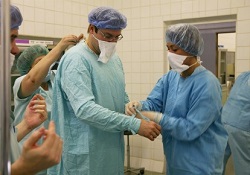When you are expecting a child, you can read all the books you want, but you still have to depend on your doctor to ensure that you take all the right steps to ensure the health and safety of your unborn child. With proper testing and screening, your doctor can tell you if your child will likely be born with a birth defect, such as Down Syndrome, Spina Bifida or Sickle Cell Anemia. If your doctor fails to use reasonable care to either conduct appropriate screening, or negligently interprets test results, you may have a claim for “wrongful birth” of a special needs child.
There are a number of different types of screening tests you can have administered. Some are invasive, but many are not. If circumstances warrant, you may be a candidate for what is known as amniocentesis, or for chorionic villi sampling. With amniocentesis, the placenta must be punctured to obtain a sample of your amniotic fluid, which encapsulates the fetus. With chorionic villi sampling, medical professionals will take a sample of your chorionic tissue for screening.
The less invasive procedures include:
- ultrasounds;
- genetic tests;
- nuchal translucency tests; and
- maternal blood serum screening.
As a general rule, you should expect to have prenatal screening throughout the course of your pregnancy, starting in the first trimester. Some of the least invasive types of procedures can be conducted fairly early in your pregnancy, but can provide critical information about the potential viability of your pregnancy, or may be cause to engage in more complex testing and monitoring over the course of gestation.
If your child is born with what should have been a detectable birth defect, you may have a claim against the doctor for misreading test results or for failing to order necessary tests. You may also have a claim against a lab, if there was an error in administering the test.
Contact Taylor & Boguski
At Taylor & Boguski, we have more than 70 years of combined experience representing people across New Jersey with medical malpractice and personal injury matters. For a free initial consultation, send us an e-mail or call us at 856-200-8989.


 When properly diagnosed and treated, jaundice (also known as Hyperbilirubinemia) is essentially harmless. It’s a fairly common condition in newborns, with some studies finding that as many as one in four infants have some level of jaundice. It’s caused by an overabundance of a protein—bilirubin—in the blood of a new baby, and is usually effectively treated with ultraviolet light. However, if not properly treated, it may build up to such a level that the protein stays in the brain cell of the infant, causing permanent brain damage (a condition known as “kernicterus”).
When properly diagnosed and treated, jaundice (also known as Hyperbilirubinemia) is essentially harmless. It’s a fairly common condition in newborns, with some studies finding that as many as one in four infants have some level of jaundice. It’s caused by an overabundance of a protein—bilirubin—in the blood of a new baby, and is usually effectively treated with ultraviolet light. However, if not properly treated, it may build up to such a level that the protein stays in the brain cell of the infant, causing permanent brain damage (a condition known as “kernicterus”). When you are giving birth to a child, there’s always the possibility that, once the baby’s head is out of the birth canal, one of its shoulders will get caught on your pubic bone, a condition known as “Shoulder Dystocia.” If your delivering physician fails to take appropriate steps, your child can suffer very serious consequences, including damage to the brachial plexus nerves that control the shoulder, arms, hands and fingers. This can lead to loss of use or paralysis. In rare situations, shoulder Dystocia may impede the flow of blood and oxygen, causing brain damage, cerebral palsy or even death.
When you are giving birth to a child, there’s always the possibility that, once the baby’s head is out of the birth canal, one of its shoulders will get caught on your pubic bone, a condition known as “Shoulder Dystocia.” If your delivering physician fails to take appropriate steps, your child can suffer very serious consequences, including damage to the brachial plexus nerves that control the shoulder, arms, hands and fingers. This can lead to loss of use or paralysis. In rare situations, shoulder Dystocia may impede the flow of blood and oxygen, causing brain damage, cerebral palsy or even death. If your marriage isn’t working, the typical response is to legally end it by
If your marriage isn’t working, the typical response is to legally end it by  Kids just love to ride a bike, but statistics show that
Kids just love to ride a bike, but statistics show that  If your marriage is over, you can always
If your marriage is over, you can always  It’s become a far too common occurrence—a motorist parks on the street and opens the traffic-side door without looking, putting the open door directly in the path of an oncoming vehicle, or even worse, a cyclist. In a study conducted in Chicago earlier this decade, researchers found that “dooring crashes”—where bicyclist collided with the open door of a parked vehicle—accounted for almost one in five bicycle-related accidents (19.7%). A similar study in Boston found that about one in ten bicycle crashes involved “dooring.”
It’s become a far too common occurrence—a motorist parks on the street and opens the traffic-side door without looking, putting the open door directly in the path of an oncoming vehicle, or even worse, a cyclist. In a study conducted in Chicago earlier this decade, researchers found that “dooring crashes”—where bicyclist collided with the open door of a parked vehicle—accounted for almost one in five bicycle-related accidents (19.7%). A similar study in Boston found that about one in ten bicycle crashes involved “dooring.”  If you or someone you love has suffered a traumatic brain injury (TBI), your needs can be great. You may require long-term and constant care, may need to have your home retrofitted to meet your needs, and may have to have in-home continual care. When insurance, public assistance and personal resources are inadequate to meet your needs, the state of New Jersey offers help through the Traumatic Brain Injury (TBI) Fund.
If you or someone you love has suffered a traumatic brain injury (TBI), your needs can be great. You may require long-term and constant care, may need to have your home retrofitted to meet your needs, and may have to have in-home continual care. When insurance, public assistance and personal resources are inadequate to meet your needs, the state of New Jersey offers help through the Traumatic Brain Injury (TBI) Fund. If you have concluded that it’s time to end your marriage, but you don’t perceive the need for a lengthy battle over
If you have concluded that it’s time to end your marriage, but you don’t perceive the need for a lengthy battle over